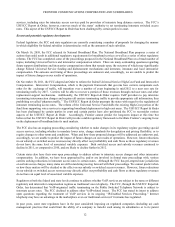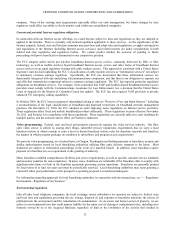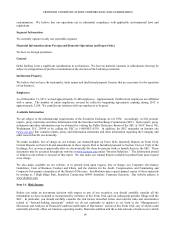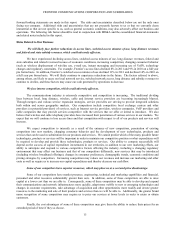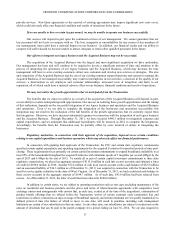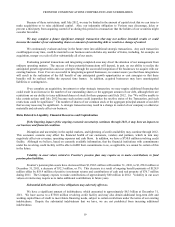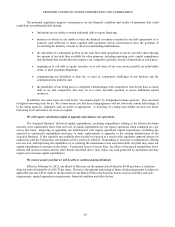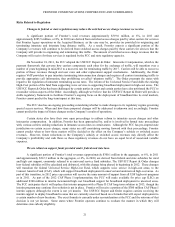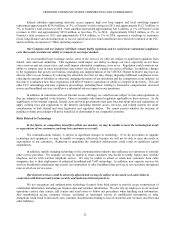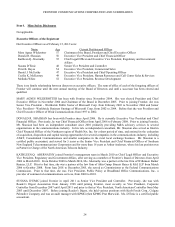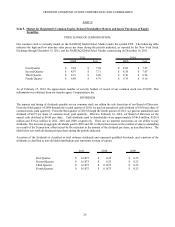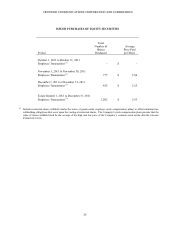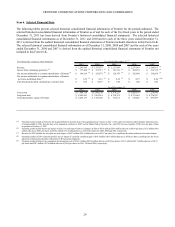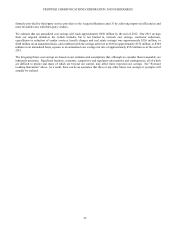Frontier Communications 2011 Annual Report Download - page 25
Download and view the complete annual report
Please find page 25 of the 2011 Frontier Communications annual report below. You can navigate through the pages in the report by either clicking on the pages listed below, or by using the keyword search tool below to find specific information within the annual report.FRONTIER COMMUNICATIONS CORPORATION AND SUBSIDIARIES
22
Federal subsidies representing interstate access support, high cost loop support and local switching support
represented approximately $154.0 million, or 3%, or Frontier’s total revenues in 2011 and approximately $112.7 million, or
3%, or Frontier’s total revenues in 2010. State subsidies represented approximately $41.6 million, or 1%, of Frontier’s total
revenues in 2011 and approximately $25.8 million, or less than 1%, in 2010. Approximately $104.5 million, or 2%, of
Frontier’s total revenues in 2011 and approximately $73.8 million, or 2% in 2010, represent a surcharge to customers
(local, long distance and interconnection) to recover universal service fund contribution fees which are remitted to the FCC
and recorded as an expense in “Other operating expenses.”
Our Company and our industry will likely remain highly regulated, and we could incur substantial compliance
costs that could constrain our ability to compete in our target markets.
As an incumbent local exchange carrier, some of the services we offer are subject to significant regulation from
federal, state and local authorities. This regulation could impact our ability to change our rates, especially on our basic
voice services and our access rates, and could impose substantial compliance costs on us. Regulation could constrain our
ability to compete and, in some jurisdictions, may restrict our ability to expand our service offerings. In addition, changes
to the regulations that govern our business (including any implementation of the USF/ICC Report & Order) may have an
adverse effect on our business by reducing the allowable fees that we may charge, imposing additional compliance costs,
reducing the amount of subsidies or otherwise changing the nature of our operations and the competition in our industry. At
this time it is unknown how these regulations will affect Frontier’s operations or ability to compete in the future. This and
other FCC rulemakings and state regulatory proceedings, including those relating to intercarrier compensation, universal
service and broadband services, could have a substantial adverse impact on our operations.
In addition, in connection with our Internet access offerings, we could become subject to laws and regulations as
they are adopted or applied to the Internet. There is currently only limited regulation applicable to these services. As the
significance of the Internet expands, federal, state and local governments may pass laws and adopt rules and regulations, or
apply existing laws and regulations to the Internet (including Internet access services), and related matters are under
consideration in both federal and state legislative and regulatory bodies. We cannot predict whether the outcome of
pending or future proceedings will prove beneficial or detrimental to our competitive position.
Risks Related to Technology
In the future, as competition intensifies within our markets, we may be unable to meet the technological needs
or expectations of our customers, and may lose customers as a result.
The communications industry is subject to significant changes in technology. If we do not replace or upgrade
technology and equipment, we may be unable to compete effectively because we will not be able to meet the needs or
expectations of our customers. Replacing or upgrading the combined infrastructure could result in significant capital
expenditures.
In addition, rapidly changing technology in the communications industry may influence our customers to consider
other service providers. For example, we may be unable to retain customers who decide to totally replace their wireline
telephone service with wireless telephone service. We may be unable to attract or retain new customers from cable
companies due to their deployment of enhanced broadband and VoIP technology. In addition, new capacity services for
wireless broadband technologies may permit our competitors to offer broadband data services to our customers throughout
most or all of our service areas.
Our Internet services could be adversely affected and we may be subject to increased costs and claims in
connection with Internet and systems security and malicious Internet practices.
We use encryption and authentication technology licensed from third parties to provide secure transmission of
confidential information, including our business data and customer information. We also rely on employees in our network
operations centers, data centers, call centers and retail stores to follow our procedures when handling such information.
Any unauthorized access, computer viruses, accidental or intentional release of confidential information or other
disruptions could result in increased costs, customer dissatisfaction leading to loss of customers and revenues, and fines and
other liabilities.


